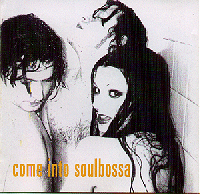
| Soulbossa (rainy summer remix) |
|
Making comparisons between one pop group and another is a dicey business. It's only natural to reach for them, since describing sound is like trying to paint water; but it ought to be recognised that when I compare or connect, what I'm really doing is quoting my own taste, creating my own idealised version of pop lineage, with as many misconceptions, prejudices and blank spots as tangential insights and ideas. For the reader, comparisons are handles by which to pick up a group, or put it down again. For the group themselves, they are usually an irritation; convincing evidence of having been misunderstood.
Bearing that in mind, let's try a cinematic comparison, for a change. One retelling of the Wyatt Earp legend (you know, the gunfight at the O.K. Corral and all that) sees the hero proclaim the following message to a gunman he is allowing to escape: 'You tell them the Law's coming - and Hell's coming with me! Hell is coming with me!' That's the spirit of Soulbossa. The leanest and the meanest pop group, no contest. You'd think that by the fifth or sixth time you see a group, they'd have little chance of surprising you, that there would be little new left to show. Although the sound isn't that different, the Soulbossa experience has picked up so much intensity that there's barely any slack. Just the briefest of pauses at the end of each song, and then straight into another, each one played by the group as if their lives depended upon it. From performance to performance, old songs have justifiably made way for the new at a prodigious rate: you'd be lucky to hear one you recognise. What you will hear are songs which are more dynamic, more emotional, more focussed. And more frightening: how can three people come up with such an elemental pop noise? Put it like this: raw and bloody stop-start bass-drums-guitar-croonshouter cacophony dosed with venom, an original slant on the trashy psychoblues. Importantly for a trio, there is no weak link. Peter treats his guitar as if it's his oldest friend at one moment, and his newest enemy the next. Lyrically, it seems to be retaliation all the way, masking the pain that was presumably the source of the songs. Vocally, Peter has a yowling wail to beat all wailing yowls. It's easy to imagine voice-loss as one of the hazards of belting them out like he does; makes my voice feel hoarse just listening to him. Alongside, Tracy twangs and thumps a mean bass, while drummer Michael takes the constant rhythmic pauses and shifts in his stride. Together they build and destroy their songs, often in a surprisingly intricate way. When I first saw Soulbossa, they had no regard for how the audience were coping. I'm happy to report that they continue to seem not to care whether people applaud or sit on their hands. In Head-on, his endearing, painful and addled memoir of the music scene in Liverpool at the end of the '70s and the beginning of the '80s, Julian Cope explains the simple difference between the Teardrop Explodes and Echo & the Bunnymen. The latter were the kind of group that played to impress, whereas, says Cope, the Teardrops played to express. Soulbossa belong firmly in Julian's camp; how many groups of the Bunnymen persuasion would you like me to name? Let me finally resort to a couple of direct musical comparisons. The Jon Spencer Blues Explosion are Soulbossa's American cousins, or at least relatives who show up for the occasional Thanksgiving lunch. They have in common the hellfire vocals, the unexpected chord manoeuvres, the rhythmic acceleration and emergency braking. Heading into the '80s, Soulbossa put me in mind of yet another trio, Big Flame, who combined eight chord changes a second and vengeful vocals within explosive two and a half minute structures. As ancestors of Soulbossa pre-Big Flame, I might mention the Pop Group, and reaching further still into the past, any one of a number of '60s garage acts; but someone else might equally well come up with the Cramps, and rock'n'roll, which this writer knows little about. Soulbossa are not the types to outstay their welcome. The job done, they hang up their holsters and go have themselves some fun. Such groups either don't make many records or last about as long as the strike of a match. Big Flame combusted after six singles. But for now, Soulbossa look like they're inclined to stick around. Currently in the studio, and on the brink of securing greater attention, watch the listings for their next saloon bar appearance, and look out in the near future for a CD containing technologically enhanced future classics like 'In the wrong' and 'a.m.' In the meantime, if you're not cooling off overnight in the Sheriff's jail, you'll find 1997's Come Into Soulbossa as compelling as the gunfight at the O.K. Corral.
Dishy Recordings: 74 Gibson Gardens, London, N16 7HD | |